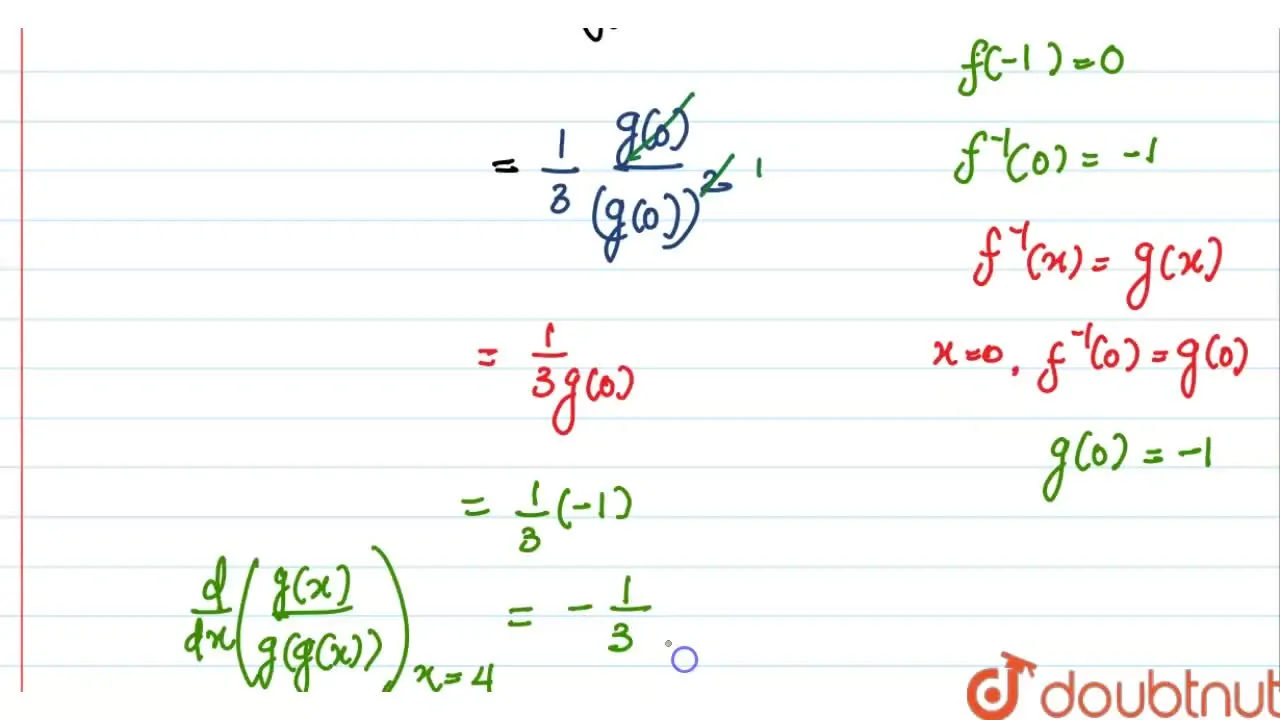If f(x)=x3+3x+4 and g is the inverse function of f(x), then the value of ddx(g(x)g(g(x))) at x = 4 equalsSolution in Tamil
−16
6
−13
non-existent
ddx(g(x)g(g(x)))=g(g(x)).g'(x)−g(x).g'(g(x)).g'(x)g(g(x))2
Now, f(0) = 4
⇒ f−1(4)=g(4)=0
and g'(4)=1f'(0)=13.
Also, f(-1)=0
⇒ f−1(0)=g(0)=−1
∴ ddx(g(x)g(g(x)))x=4
=g(g(4))g'(4)−g(4)g'(g(4))g'(4)(g(4))2
=g(0)⋅1f'(0)−0(g(0))2
=−1×131
=−13
Related Playlists
- BOOK - CENGAGECHAPTER - DIFFERENTIATIONEXERCISE - Exercise (Multiple)22videos
DIFFERENTIATION
- BOOK - CENGAGECHAPTER - DIFFERENTIATIONEXERCISE - Exercise (Comprehension)23videos
DIFFERENTIATION
- BOOK - CENGAGECHAPTER - DIFFERENTIATIONEXERCISE - Exercise 3.914videos
DIFFERENTIATION
- BOOK - CENGAGECHAPTER - DIFFERENTIAL EQUATIONSEXERCISE - Question Bank7videos
DIFFERENTIAL EQUATIONS
- BOOK - CENGAGECHAPTER - DOT PRODUCTEXERCISE - DPP 2.115videos
DOT PRODUCT
Similar Questions
If y=e√x+e−√x , then dydxisequa<o e√x2√x (b) e√x−e−√x2x 12√x√y2−4 (d) 12√x√y2+4
04:50View Solutionf(x) is a polynomial function, f:R→R, such that f(2x)=f'(x)f''(x). The value of f(3) is
02:14View SolutionLet f(x+y)=f(x).f(y) for all xandy. Suppose f(5)=2andf′(0)=3. Find f′(5).
03:01View SolutionFind the real value of m for which the subsititution y=um will transform the differential equation 2x4ydydx+y4=4x6 in to a homogenous equation.
03:50View SolutionLet a,b>0 and →α=(→ia+4ˆjb+bˆk) and →β=bˆi+aˆj+1bˆk, then the maximum value of 305+→α.→β is
02:10View SolutionIf f(x)andg(x) are two differentiable functions, show that f(x)g(x) is also differentiable such that ddx[f(x)g(x)]=f(x)ddx{g(x)}+g(x)ddx{f(x)}
03:41View SolutionIf f(x)andg(x) are differentiate functions, then show that f(x)±g(x) are also differentiable such that ddx{f(x)±g(x)}=ddx{f(x)}±ddx{g(x)}
05:58View SolutionIf f(x)andg(f) are two differentiable functions and g(x)≠0 , then show that f(x)g(x) is also differentiable ddx{f(x)g(x)}=g(x)ddx{f(x)}−f(x)ddx{g(x)}[g(x)]2
06:44View SolutionUsing the first principle, prove that: ddx(f(x)g(x))=f(x)ddx(g(x))+g(x)ddx(f(x))
02:14View Solutionif (d)/(dx)f(x)=g(x), find the value of int_(a)^(b)f(x)g(x)dx
01:17View SolutionIf (d)/(dx)f(x)=g(x), then int f(x)g(x)dx is equal to:
04:28View SolutionIf f(x) and g(x) are differentiable function ; then show that f(x)±g(x) are also differentiable such that df(x)±g(x)dx=df(x)dx±dg(x)dx
07:06View SolutionIf f(x)=x3+3x+4 and g is the inverse function of f(x), then the value of ddx(g(x)g(g(x))) at x = 4 equals
04:09View SolutionIf ddx[f(x)]=f(x), then ∫f(x)[g'(x)+g''(x)]dx=
03:39View SolutionIf ddxf(x)=g(x), then the value of ∫baf(x)g(x)dx is -
04:26View SolutionUsing the first principle, prove that: ddx(f(x)g(x))=f(x)ddx(g(x))+g(x)ddx(f(x))
03:47View Solution


